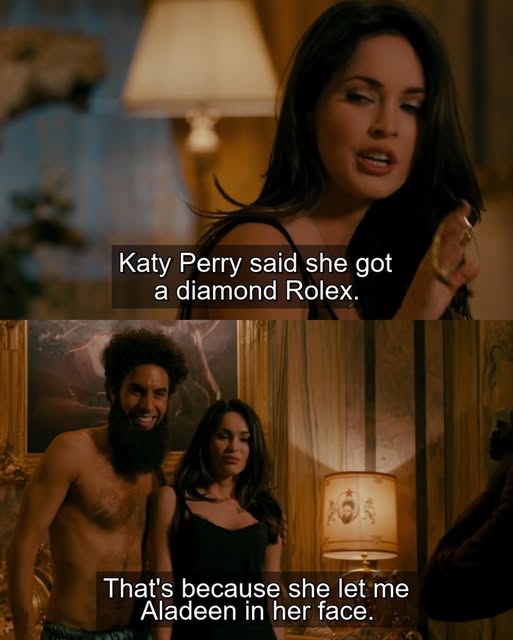Released in 2012, The Dictator is a politically charged comedy that marks a stark departure from Sacha Baron Cohen’s prior mockumentary style (as seen in Borat and Brüno). Instead, Cohen steps into the realm of scripted narrative film, portraying General Aladeen, a tyrannical yet buffoonish ruler of the fictional North African nation of Wadiya. The film, co-written by Cohen, Alec Berg, David Mandel, and Jeff Schaffer, skewers authoritarian regimes while taking sharp jabs at Western foreign policy and political correctness.
Plot Summary

General Aladeen is an egotistical, iron-fisted leader whose life of unchecked power is upended when he travels to the United States to address the UN Security Council about his country’s nuclear weapons program. After an assassination attempt orchestrated by his uncle (Ben Kingsley), Aladeen finds himself replaced by a dimwitted body double. Stranded in New York without his trademark beard or entourage, Aladeen must navigate a world without privilege. He finds unexpected help from Zoey (Anna Faris), a socially conscious activist running a Brooklyn food co-op. Chaos, culture clashes, and cutting satire ensue as Aladeen fights to regain power while grappling with his own transformation.
Themes and Satire
The Dictator is a rich text of political and cultural satire. While it unapologetically mocks despotic rulers—General Aladeen is a collage of traits from real-life tyrants like Muammar Gaddafi, Saddam Hussein, and Kim Jong-il—it also turns its sights on the Western world.
Key themes include:
- Autocracy vs. Democracy: The film’s climax includes a sardonic monologue where Aladeen ironically praises the U.S. for being like a dictatorship, listing characteristics that blur the line between democracy and totalitarianism.
- Racism and Stereotyping: Cohen exposes and plays with racial and ethnic stereotypes, often making audiences question their own biases.
- The Illusion of Freedom: Through Aladeen’s arc and the setting of New York City, the film critiques how “freedom” is sold as an idea in both capitalist and authoritarian contexts.
Reception
Critically, The Dictator received mixed reviews. Some praised Cohen’s fearless comedy and the film’s biting commentary, while others found its humor too crude or unfocused. It holds a 57% approval rating on Rotten Tomatoes, with the consensus noting that while the jokes are uneven, Cohen’s performance is committed and daring.
Audiences, however, were divided. Fans of Cohen’s previous work appreciated the unapologetic offensiveness and political edge, while others found the humor abrasive or outdated. Its box office performance was moderate, grossing around $179 million worldwide.
Cultural Impact
Though not as influential as Borat, The Dictator stands out as a bold satire released in the politically sensitive post-9/11 and Arab Spring era. It sparked debate about the boundaries of comedy, the ethics of stereotyping, and the Western gaze on Middle Eastern politics.
Aladeen’s infamous UN speech and Cohen’s promotional stunts—including throwing an urn allegedly filled with Kim Jong-il’s ashes onto Ryan Seacrest at the Oscars—kept the film in the headlines, ensuring its legacy as a provocative piece of political satire.
Conclusion
The Dictator is a film that both offends and enlightens, using farcical humor to tackle serious issues like oppression, imperialism, and hypocrisy. While not universally loved, it remains an important cultural artifact that challenges viewers to laugh while thinking critically about power, privilege, and propaganda.
Whether viewed as a comedy of errors or a searing indictment of global politics, The Dictator is unmistakably a Sacha Baron Cohen creation: chaotic, clever, and controversial.



